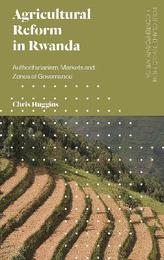
|
Agricultural Reform in Rwanda: Authoritarianism, Markets and Zones of Governance
Paperback / softback
Main Details
| Title |
Agricultural Reform in Rwanda: Authoritarianism, Markets and Zones of Governance
|
| Authors and Contributors |
By (author) Chris Huggins
|
| Series | Politics and Development in Contemporary Africa |
|---|
| Physical Properties |
| Format:Paperback / softback | | Pages:256 | | Dimensions(mm): Height 216,Width 135 |
|
| Category/Genre | Development economics |
|---|
| ISBN/Barcode |
9781786990013
|
| Classifications | Dewey:338.10967571 |
|---|
| Audience | | Tertiary Education (US: College) | |
|---|
|
Publishing Details |
| Publisher |
Bloomsbury Publishing PLC
|
| Imprint |
Zed Books Ltd
|
| Publication Date |
15 April 2019 |
| Publication Country |
United Kingdom
|
Description
International observers have lauded Rwanda as an example of an African country taking control of its own development trajectory, and as a market-friendly destination for investment. A key component of this narrative has been an ambitious programme of agricultural reform, involving private firms, NGOs, and international charities. The Rwandan government claims these reforms have been a resounding success, tripling crop yields and helping to combat hunger. Chris Huggins argues, however, that Rwanda's liberal, modernising image sits poorly with the regime's continuing authoritarian tendencies. Featuring in-depth case studies of the effects of agricultural reform in three different regions, and drawing on hundreds of interviews, Huggins shows that the much-vaunted 'liberalization' of agriculture has in fact depended on the coercion of Rwandan farmers, and in many cases has had a detrimental impact on their livelihoods. With the Kagame regime now coming under increasing international scrutiny, this work provides a timely look at the impact of 'market friendly authoritarianism' in contemporary Africa, making essential reading for students and scholars of development in the fields of sociology, anthropology, political science, and economics.
Author Biography
Chris Huggins is an assistant professor at the School of International Development and Global Studies, University of Ottawa, as well as being an adjunct professor at the Institute of African Studies, Carleton University, and a non-resident research fellow at the African Centre for Technology Studies (ACTS). He previously worked for Human Rights Watch as their Rwanda researcher, and as a consultant for the United States Agency for International Development. His previous books include Conflict and Housing, Land, and Property Rights (with Scott Leckie, 2011) and From the Ground Up: Land Rights, Conflict and Peace in Sub-Saharan Africa (co-edited with Jenny Clover, 2005).
ReviewsAn important contribution to the literature on postgenocide Rwanda. It is also, more broadly, a must-read for anyone interested in the global processes of agrarian transformation. * African Affairs * An in-depth analysis of Rwanda's problematic rural reengineering project. It is an essential contribution to the contemporary literature on post-conflict reconstruction and development. * An Ansoms, co-author of Losing your Land: Dispossession in the Great Lakes * In a nuanced and compelling account, Chris Huggins explores why Rwanda's ambitious agricultural modernization program has undermined the livelihoods of many of the country's smallholder farmers. It should be required reading for scholars and practitioners engaged with state-sponsored rural development in Africa. * Catharine Newbury, Smith College (Emeritus) * A well researched book on Rwanda, using an interesting blend of theoretical insights. It highlights the drama in Africa associated with capturing peasants for national development while at the same time avoiding elite capture of the public good. * Goran Hyden, University of Florida (Emeritus) * Based on detailed fieldwork, this book substantially advances our understanding of the Rwandan story. Anyone interested in the political economy of African agriculture should read this book. * Ian Scoones, co-editor of Africa's Land Rush: Rural Livelihoods and Agrarian Change * An extraordinary study of the state-directed commercialization of Rwandan agriculture. In this nuanced account, Huggins reworks the contemporary agrarian question. * Philip McMichael, author of Food Regimes and Agrarian Questions * Theoretically sophisticated and rich in empirical detail. The book deserves a wide readership and can profitably be read by scholars and policy makers alike. * Rita Abrahamsen, University of Ottawa * Drawing on his deep knowledge of Rwanda and extensive fieldwork, Huggins convincingly demonstrates that Rwanda's agricultural development programs represent an extension of the state's authoritarian control, and lead to popular resentment and resistance. * Timothy Longman, Director of the African Studies Center at Boston University * A very informed, nuanced analysis of agriculture in Rwanda, spanning zones of governance, compliance and resistance in a "developmental" state. As always, only some citizens and communities benefit. This book shows us why. * Timothy M. Shaw, University of Massachusetts Boston *
|